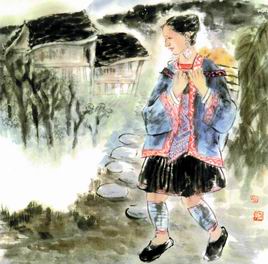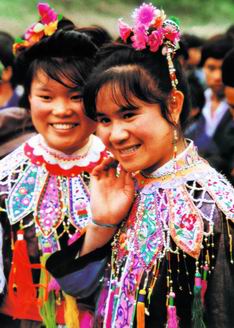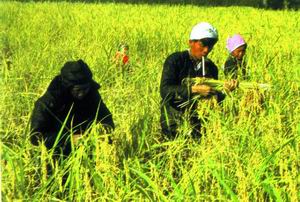Two and a half million Dong people are located in Southeastern Guizhou, Southwestern Hunan, and Northeastern
 Guangxi with a few found in Enshi county of Southwestern Hubei in China. They usually live along meandering streams that are found in this very mountainous region. Generally, they reside in small villages although a few live in larger towns. It is believed that the Dong originated from modern Thailand, emigrating to China more than 3000 years ago. Reference to the Dong nationality can be found in ancient Chinese historical sources from as far back as the Qin Dynasty (221-207 BC). Guangxi with a few found in Enshi county of Southwestern Hubei in China. They usually live along meandering streams that are found in this very mountainous region. Generally, they reside in small villages although a few live in larger towns. It is believed that the Dong originated from modern Thailand, emigrating to China more than 3000 years ago. Reference to the Dong nationality can be found in ancient Chinese historical sources from as far back as the Qin Dynasty (221-207 BC).
The Dong language belongs to the Sino-Tibetan language family, the Kam-Dai branch, and the Kam-Sui group. It is dividedsintosNorthern and Southern varieties. Every variety is divided againsintosthree local vernaculars. Although a very difficult language to speak due to its 15 tonal variations, the Dong language is the primary means of communication for this people. In the 1950s, the government worked out a Dong written language on the basis of the Roman alphabet. However, the Dong continue to use Chinese characters, in their written communications.
The Dong tend to cluster by families or as clans in villages. These villages may contain anything up to 600 families and a typical village will consist of familiesshavingsonly one or two surnames. The Dong are essentially an agricultural society.
Dong people are very good at dancing and singing. They celebrate their festivals with rich and colorful games ,songs and dances. However, the Dong people are not only good at singing and dancing, but also experts in knitting and building.
The drum towers are in the shape of a wood pagoda. Without a single nail or rivet, the towers could be three-to-ten-storey high. The tower is spacious inside and has wood rails circling each floor. There is a calabash or crane on the top of the tower symbolizing auspiciousness and peace. The delicately wrought protruding eaves look as if to fly and leap. The square in front of, and the stage connected with the tower are the centre of celebration activities.
Wind and rain bridge, also called flower bridge, is another unique building of Dong people. As the weather in the region is changeable, Dong people build corridors on the bridges so passers-by could take shelter from the sun, wind and rain or take a rest. So the bridge is called wind and rain bridge. On the corridor and eaves of pavilions are carved with paintings featuring coloured and vivid figures, mountains and rivers, patterns and animal, displaying the Dong's national characteristics as well as their diligence and wisdom. Wind and rain bridges are the art treasures of Chinese wood architecture.
Custom
 In traditional Dong area, there are some special activities to celebrate the wedding and the new born baby. In traditional Dong area, there are some special activities to celebrate the wedding and the new born baby.
There must be a guide for the Bridegroom and Bride.This guide will help bridegroom to meet his bride. This is Dong's wedding custom. The man should be the luckiest member from a four-generation family which has numerous members. Before the wedding day, the guide should take required gifts to the bride's home. Early next morning, girls of the village woke up the bride and made camillia tea with pig's bowels. After a rich breakfast, the girls will let the bride on the way. The guide must be smart and eloquent, not afraid of questions. The happier the girls and the relatives of the bride's are, the more easy-going the bride is. Camillia tea cooked with pig's bowels symbolizes that the girls of the village miss the bride and their hearts are linked together.
Changing lampwick is another Dongs"wedding custom. On the eve of wedding after the cock crows three times, the guide will put bridegroom's lantern on the door of the bride's home and urge three times. The bride is reluctant to go out. Before going out with the guide the bride cuts the straw wick in lantern and takes out a new silk band to tie on the lantern, which implies her heart connected with the bridegroom's
The Dong have an unusual custom of planting 18 fir trees when a child is born - these trees become a resource for building a house when the child eventually gets married. After marriage, women live with their parents until after the birth of the first child.
Festivals
Besides the traditional Chinese holiday, Dong Nationality has their own festivals
Yueye Festival
Yueye is the traditional festival of Dong Nationality, which comes from the Dong Dialect with the meaning of being guests collectively. Generally Yueye will be held in Lunar January and Lunar August, in which the road-blocking songs will be song. One of the most respectable of village A will lead be representatives from every family to visit village B. Usually each family will send one person to representative. When the guests from village A are near village B, the hosts from village B must meet them at the entrance while making blockade on the way with farm tools or households. Host team will ask questions by singing and the guest team will answer with songs. One right answer will make one blockade removed. However if the answer is wrong, the gu ests will set off the fireworks to show their apology and admiration. Then, hosts will clear all the blockades to welcome the guests to take part in the celebration. In the festival Dong drama, Dong songs, dragon and lion dance, reed-pipe performance will be performed. After the celebration, hosts will see off the guests and sing blocking-road songs again to show their regret at parting from.
Flowery Shell Festival
Flowery Shell Festival is a traditional festival of Dong Nationality with more than 100-year history, in which an athletic game will play then. Flowery Shell Festival is held on lunar May 3.Insgroupsto make it more animated, villages set 3 iron shells, the first tied to a ring with red ribbon. When the shell is shot and the ring fell, villagers strive to get the ring. The one who gets the ring will get the first prize. There are totally three shells. The first impliesshavingsa flourishing population, the second shows a good fortune and the third shot for a good harvest. The shell fodder ignites the shell and the iron ring shoots to the sky. After the game, the lads and lasses gather together to dance and play the reed-pipe wind instrument. At night, campfires are here and there: young people perform Dong drama and sing songs in antiphonal.
Nature is the God
 The Dong practice pantheism (the belief that laws and spiritual forces are gods) and animism (belief that non-human objects have souls). In everyday life, there exists among the Dong animistic religious beliefs and practicesswheresbenevolent and malevolent spirits exist everywhere in nature. They often regard certain stones, trees and plots of land as being sacred. Some also practice Tu, a form of "Magic" One god, a "Kitchen god"is worshipped during their spring and fall festivals. In the spring, they ask him for steady plant growth and in the fall for an abundant harvest. The Dong practice pantheism (the belief that laws and spiritual forces are gods) and animism (belief that non-human objects have souls). In everyday life, there exists among the Dong animistic religious beliefs and practicesswheresbenevolent and malevolent spirits exist everywhere in nature. They often regard certain stones, trees and plots of land as being sacred. Some also practice Tu, a form of "Magic" One god, a "Kitchen god"is worshipped during their spring and fall festivals. In the spring, they ask him for steady plant growth and in the fall for an abundant harvest.
Valleys, rivers, mountains, trees, rocks, bridges, and wells all have spiritual significance and attending spirits. These must be acknowledged and taken care of in a proper way so as not to destroy any existing balance. In some parts of the mountains, land cannot be dug, trees cannot be cut and stones cannot be cracked. If the people trespass against these beliefs, it is firmly thought that disaster is sure to follow.
| ![]() 本网站由北京信息港提供网络支持
本网站由北京信息港提供网络支持
![]() 本网站由北京信息港提供网络支持
本网站由北京信息港提供网络支持